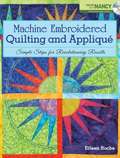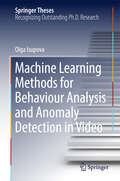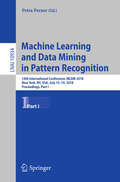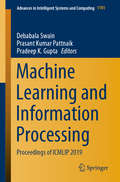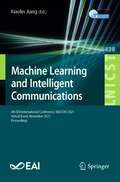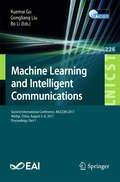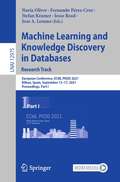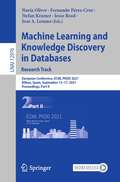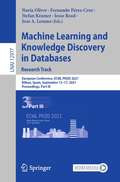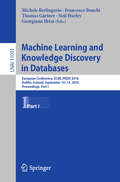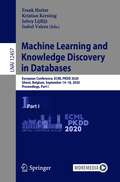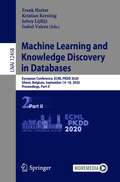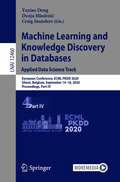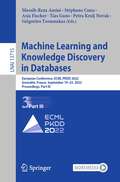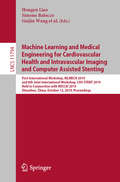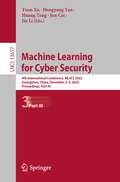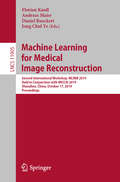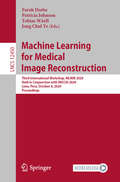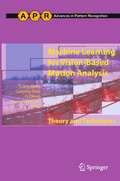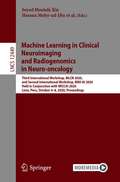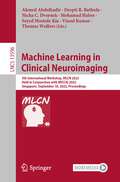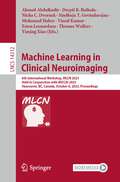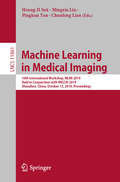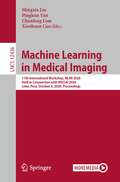- Table View
- List View
Machine Embroidered Quilting and Appliquè
by Eileen RocheTurn the traditional quilting process upside-out with an embroidery machine and revolutionary new techniques! Author Eileen Roche, editor of Designs in Machine Embroidery magazine, will show you how to streamline the process of quilting and applique with an embroidery machine. This fast and easy process produces flawless results! Instead of piecing first, then quilting, the projects in this book are quilted and appliqued in the hoop, then pieced together into quilts and more. These steps eliminate the tedious cutting and piecing of traditional quilting techniques. In Machine Embroidered Quilting and Applique you'll find: 12 easy techniques: learn how to do continuous quilting and continuous applique with an embroidery machine, plus 10 more techniques that build on these skills 12 gorgeous projects: make everything from quick and easy coasters to practical and pretty totes, plus 4 beautiful quilts. 2 world class teachers: along with an expert author, this book also features notes from sewing and craft expert Nancy Zieman sprinkled throughout the pages offer even more expert advice. Revolutionize your quilting and applique today!
Machine Embroidery with confidence
by Nancy ZiemanNancy Zieman, the nation's most recognized and revered sewing expert, teaches aspiring and experienced embroiders everything they need to know to master this craft. An easy-to-understand tutorial explains the basics of machine embroidery, and detailed photos and illustrations depict every step of using these machines for top-notch results. Readers will learn about what tools are needed, how to organize the embroidery area, types of machines, designs, templating/positioning, software, stabilizers, hooping fabrics, trouble shooting and finishing touches. The book also shows readers how to apply those skills as they use machine embroidery to embellish everything from hats and shirts to blankets and towels. Easy-to-follow tutorial for beginners in machine embroidery Features a glossary of common terms Provides inspiration or moving beyond the basics into more advanced projects
Machine Learning Methods for Behaviour Analysis and Anomaly Detection in Video (Springer Theses)
by Olga IsupovaThis thesis proposes machine learning methods for understanding scenes via behaviour analysis and online anomaly detection in video. The book introduces novel Bayesian topic models for detection of events that are different from typical activities and a novel framework for change point detection for identifying sudden behavioural changes.Behaviour analysis and anomaly detection are key components of intelligent vision systems. Anomaly detection can be considered from two perspectives: abnormal events can be defined as those that violate typical activities or as a sudden change in behaviour. Topic modelling and change-point detection methodologies, respectively, are employed to achieve these objectives.The thesis starts with the development of learning algorithms for a dynamic topic model, which extract topics that represent typical activities of a scene. These typical activities are used in a normality measure in anomaly detection decision-making. The book also proposes a novel anomaly localisation procedure. In the first topic model presented, a number of topics should be specified in advance. A novel dynamic nonparametric hierarchical Dirichlet process topic model is then developed where the number of topics is determined from data. Batch and online inference algorithms are developed.The latter part of the thesis considers behaviour analysis and anomaly detection within the change-point detection methodology. A novel general framework for change-point detection is introduced. Gaussian process time series data is considered. Statistical hypothesis tests are proposed for both offline and online data processing and multiple change point detection are proposed and theoretical properties of the tests are derived. The thesis is accompanied by open-source toolboxes that can be used by researchers and engineers.
Machine Learning and Data Mining in Pattern Recognition: 14th International Conference, MLDM 2018, New York, NY, USA, July 15-19, 2018, Proceedings, Part I (Lecture Notes in Computer Science #10934)
by Petra PernerThis two-volume set LNAI 10934 and LNAI 10935 constitutes the refereed proceedings of the 14th International Conference on Machine Learning and Data Mining in Pattern Recognition, MLDM 2018, held in New York, NY, USA in July 2018. The 92 regular papers presented in this two-volume set were carefully reviewed and selected from 298 submissions. The topics range from theoretical topics for classification, clustering, association rule and pattern mining to specific data mining methods for the different multi-media data types such as image mining, text mining, video mining, and Web mining.
Machine Learning and Information Processing: Proceedings of ICMLIP 2019 (Advances in Intelligent Systems and Computing #1101)
by Prasant Kumar Pattnaik Debabala Swain Pradeep K. GuptaThis book includes selected papers from the International Conference on Machine Learning and Information Processing (ICMLIP 2019), held at ISB&M School of Technology, Pune, Maharashtra, India, from December 27 to 28, 2019. It presents the latest developments and technical solutions in the areas of advanced computing and data sciences, covering machine learning, artificial intelligence, human–computer interaction, IoT, deep learning, image processing and pattern recognition, and signal and speech processing.
Machine Learning and Intelligent Communications: 6th EAI International Conference, MLICOM 2021, Virtual Event, November 2021, Proceedings (Lecture Notes of the Institute for Computer Sciences, Social Informatics and Telecommunications Engineering #438)
by Xiaolin JiangThis volume constitutes the refereed post-conference proceedings of the 6th International Conference on Machine Learning and Intelligent Communications, MLICOM 2021, held in November 2021. Due to COVID-19 pandemic the conference was held virtually. The 28 revised full papers were carefully selected from 58 submissions. The papers are organized thematically in tracks as follows: internet of vehicle communication system; applications of neural network and deep learning; intelligent massive MIMO communications; intelligent positioning and navigation systems; intelligent space and terrestrial integrated networks; machine learning algorithms and intelligent networks; image information processing.
Machine Learning and Intelligent Communications: Second International Conference, MLICOM 2017, Weihai, China, August 5-6, 2017, Proceedings, Part I (Lecture Notes of the Institute for Computer Sciences, Social Informatics and Telecommunications Engineering #226)
by Xuemai Gu Gongliang Liu Bo LiThis two volume set constitutes the refereed post-conference proceedings of the Second International Conference on Machine Learning and Intelligent Communications, MLICOM 2017, held in Weihai, China, in August 2017. The 143 revised full papers were carefully selected from 225 submissions. The papers are organized thematically in machine learning, intelligent positioning and navigation, intelligent multimedia processing and security, intelligent wireless mobile network and security, cognitive radio and intelligent networking, intelligent internet of things, intelligent satellite communications and networking, intelligent remote sensing, visual computing and three-dimensional modeling, green communication and intelligent networking, intelligent ad-hoc and sensor networks, intelligent resource allocation in wireless and cloud networks, intelligent signal processing in wireless and optical communications, intelligent radar signal processing, intelligent cooperative communications and networking.
Machine Learning and Knowledge Discovery in Databases. Research Track: European Conference, ECML PKDD 2021, Bilbao, Spain, September 13–17, 2021, Proceedings, Part I (Lecture Notes in Computer Science #12975)
by Jesse Read Nuria Oliver Stefan Kramer Jose A. Lozano Fernando Pérez-CruzThe multi-volume set LNAI 12975 until 12979 constitutes the refereed proceedings of the European Conference on Machine Learning and Knowledge Discovery in Databases, ECML PKDD 2021, which was held during September 13-17, 2021. The conference was originally planned to take place in Bilbao, Spain, but changed to an online event due to the COVID-19 pandemic. The 210 full papers presented in these proceedings were carefully reviewed and selected from a total of 869 submissions. The volumes are organized in topical sections as follows: Research Track: Part I: Online learning; reinforcement learning; time series, streams, and sequence models; transfer and multi-task learning; semi-supervised and few-shot learning; learning algorithms and applications. Part II: Generative models; algorithms and learning theory; graphs and networks; interpretation, explainability, transparency, safety. Part III: Generative models; search and optimization; supervised learning; text mining and natural language processing; image processing, computer vision and visual analytics. Applied Data Science Track: Part IV: Anomaly detection and malware; spatio-temporal data; e-commerce and finance; healthcare and medical applications (including Covid); mobility and transportation. Part V: Automating machine learning, optimization, and feature engineering; machine learning based simulations and knowledge discovery; recommender systems and behavior modeling; natural language processing; remote sensing, image and video processing; social media.
Machine Learning and Knowledge Discovery in Databases. Research Track: European Conference, ECML PKDD 2021, Bilbao, Spain, September 13–17, 2021, Proceedings, Part II (Lecture Notes in Computer Science #12976)
by Jesse Read Nuria Oliver Stefan Kramer Jose A. Lozano Fernando Pérez-CruzThe multi-volume set LNAI 12975 until 12979 constitutes the refereed proceedings of the European Conference on Machine Learning and Knowledge Discovery in Databases, ECML PKDD 2021, which was held during September 13-17, 2021. The conference was originally planned to take place in Bilbao, Spain, but changed to an online event due to the COVID-19 pandemic. The 210 full papers presented in these proceedings were carefully reviewed and selected from a total of 869 submissions. The volumes are organized in topical sections as follows: Research Track: Part I: Online learning; reinforcement learning; time series, streams, and sequence models; transfer and multi-task learning; semi-supervised and few-shot learning; learning algorithms and applications. Part II: Generative models; algorithms and learning theory; graphs and networks; interpretation, explainability, transparency, safety. Part III: Generative models; search and optimization; supervised learning; text mining and natural language processing; image processing, computer vision and visual analytics. Applied Data Science Track: Part IV: Anomaly detection and malware; spatio-temporal data; e-commerce and finance; healthcare and medical applications (including Covid); mobility and transportation. Part V: Automating machine learning, optimization, and feature engineering; machine learning based simulations and knowledge discovery; recommender systems and behavior modeling; natural language processing; remote sensing, image and video processing; social media.
Machine Learning and Knowledge Discovery in Databases. Research Track: European Conference, ECML PKDD 2021, Bilbao, Spain, September 13–17, 2021, Proceedings, Part III (Lecture Notes in Computer Science #12977)
by Jesse Read Nuria Oliver Stefan Kramer Jose A. Lozano Fernando Pérez-CruzThe multi-volume set LNAI 12975 until 12979 constitutes the refereed proceedings of the European Conference on Machine Learning and Knowledge Discovery in Databases, ECML PKDD 2021, which was held during September 13-17, 2021. The conference was originally planned to take place in Bilbao, Spain, but changed to an online event due to the COVID-19 pandemic. The 210 full papers presented in these proceedings were carefully reviewed and selected from a total of 869 submissions. The volumes are organized in topical sections as follows: Research Track: Part I: Online learning; reinforcement learning; time series, streams, and sequence models; transfer and multi-task learning; semi-supervised and few-shot learning; learning algorithms and applications. Part II: Generative models; algorithms and learning theory; graphs and networks; interpretation, explainability, transparency, safety. Part III: Generative models; search and optimization; supervised learning; text mining and natural language processing; image processing, computer vision and visual analytics. Applied Data Science Track: Part IV: Anomaly detection and malware; spatio-temporal data; e-commerce and finance; healthcare and medical applications (including Covid); mobility and transportation. Part V: Automating machine learning, optimization, and feature engineering; machine learning based simulations and knowledge discovery; recommender systems and behavior modeling; natural language processing; remote sensing, image and video processing; social media.
Machine Learning and Knowledge Discovery in Databases: European Conference, ECML PKDD 2018, Dublin, Ireland, September 10–14, 2018, Proceedings, Part I (Lecture Notes in Computer Science #11051)
by Michele Berlingerio Francesco Bonchi Thomas Gärtner Neil Hurley Georgiana IfrimThe three volume proceedings LNAI 11051 – 11053 constitutes the refereed proceedings of the European Conference on Machine Learning and Knowledge Discovery in Databases, ECML PKDD 2018, held in Dublin, Ireland, in September 2018. The total of 131 regular papers presented in part I and part II was carefully reviewed and selected from 535 submissions; there are 52 papers in the applied data science, nectar and demo track. The contributions were organized in topical sections named as follows: Part I: adversarial learning; anomaly and outlier detection; applications; classification; clustering and unsupervised learning; deep learningensemble methods; and evaluation. Part II: graphs; kernel methods; learning paradigms; matrix and tensor analysis; online and active learning; pattern and sequence mining; probabilistic models and statistical methods; recommender systems; and transfer learning. Part III: ADS data science applications; ADS e-commerce; ADS engineering and design; ADS financial and security; ADS health; ADS sensing and positioning; nectar track; and demo track.
Machine Learning and Knowledge Discovery in Databases: European Conference, ECML PKDD 2020, Ghent, Belgium, September 14–18, 2020, Proceedings, Part I (Lecture Notes in Computer Science #12457)
by Kristian Kersting Frank Hutter Jefrey Lijffijt Isabel ValeraThe 5-volume proceedings, LNAI 12457 until 12461 constitutes the refereed proceedings of the European Conference on Machine Learning and Knowledge Discovery in Databases, ECML PKDD 2020, which was held during September 14-18, 2020. The conference was planned to take place in Ghent, Belgium, but had to change to an online format due to the COVID-19 pandemic.The 232 full papers and 10 demo papers presented in this volume were carefully reviewed and selected for inclusion in the proceedings. The volumes are organized in topical sections as follows: Part I: Pattern Mining; clustering; privacy and fairness; (social) network analysis and computational social science; dimensionality reduction and autoencoders; domain adaptation; sketching, sampling, and binary projections; graphical models and causality; (spatio-) temporal data and recurrent neural networks; collaborative filtering and matrix completion. Part II: deep learning optimization and theory; active learning; adversarial learning; federated learning; Kernel methods and online learning; partial label learning; reinforcement learning; transfer and multi-task learning; Bayesian optimization and few-shot learning. Part III: Combinatorial optimization; large-scale optimization and differential privacy; boosting and ensemble methods; Bayesian methods; architecture of neural networks; graph neural networks; Gaussian processes; computer vision and image processing; natural language processing; bioinformatics. Part IV: applied data science: recommendation; applied data science: anomaly detection; applied data science: Web mining; applied data science: transportation; applied data science: activity recognition; applied data science: hardware and manufacturing; applied data science: spatiotemporal data. Part V: applied data science: social good; applied data science: healthcare; applied data science: e-commerce and finance; applied data science: computational social science; applied data science: sports; demo track.
Machine Learning and Knowledge Discovery in Databases: European Conference, ECML PKDD 2020, Ghent, Belgium, September 14–18, 2020, Proceedings, Part II (Lecture Notes in Computer Science #12458)
by Kristian Kersting Frank Hutter Jefrey Lijffijt Isabel ValeraThe 5-volume proceedings, LNAI 12457 until 12461 constitutes the refereed proceedings of the European Conference on Machine Learning and Knowledge Discovery in Databases, ECML PKDD 2020, which was held during September 14-18, 2020. The conference was planned to take place in Ghent, Belgium, but had to change to an online format due to the COVID-19 pandemic.The 232 full papers and 10 demo papers presented in this volume were carefully reviewed and selected for inclusion in the proceedings. The volumes are organized in topical sections as follows: Part I: Pattern Mining; clustering; privacy and fairness; (social) network analysis and computational social science; dimensionality reduction and autoencoders; domain adaptation; sketching, sampling, and binary projections; graphical models and causality; (spatio-) temporal data and recurrent neural networks; collaborative filtering and matrix completion. Part II: deep learning optimization and theory; active learning; adversarial learning; federated learning; Kernel methods and online learning; partial label learning; reinforcement learning; transfer and multi-task learning; Bayesian optimization and few-shot learning. Part III: Combinatorial optimization; large-scale optimization and differential privacy; boosting and ensemble methods; Bayesian methods; architecture of neural networks; graph neural networks; Gaussian processes; computer vision and image processing; natural language processing; bioinformatics. Part IV: applied data science: recommendation; applied data science: anomaly detection; applied data science: Web mining; applied data science: transportation; applied data science: activity recognition; applied data science: hardware and manufacturing; applied data science: spatiotemporal data. Part V: applied data science: social good; applied data science: healthcare; applied data science: e-commerce and finance; applied data science: computational social science; applied data science: sports; demo track.
Machine Learning and Knowledge Discovery in Databases: European Conference, ECML PKDD 2020, Ghent, Belgium, September 14–18, 2020, Proceedings, Part IV (Lecture Notes in Computer Science #12460)
by Dunja Mladenić Yuxiao Dong Craig SaundersThe 5-volume proceedings, LNAI 12457 until 12461 constitutes the refereed proceedings of the European Conference on Machine Learning and Knowledge Discovery in Databases, ECML PKDD 2020, which was held during September 14-18, 2020. The conference was planned to take place in Ghent, Belgium, but had to change to an online format due to the COVID-19 pandemic.The 232 full papers and 10 demo papers presented in this volume were carefully reviewed and selected for inclusion in the proceedings. The volumes are organized in topical sections as follows: Part I: Pattern Mining; clustering; privacy and fairness; (social) network analysis and computational social science; dimensionality reduction and autoencoders; domain adaptation; sketching, sampling, and binary projections; graphical models and causality; (spatio-) temporal data and recurrent neural networks; collaborative filtering and matrix completion. Part II: deep learning optimization and theory; active learning; adversarial learning; federated learning; Kernel methods and online learning; partial label learning; reinforcement learning; transfer and multi-task learning; Bayesian optimization and few-shot learning. Part III: Combinatorial optimization; large-scale optimization and differential privacy; boosting and ensemble methods; Bayesian methods; architecture of neural networks; graph neural networks; Gaussian processes; computer vision and image processing; natural language processing; bioinformatics. Part IV: applied data science: recommendation; applied data science: anomaly detection; applied data science: Web mining; applied data science: transportation; applied data science: activity recognition; applied data science: hardware and manufacturing; applied data science: spatiotemporal data. Part V: applied data science: social good; applied data science: healthcare; applied data science: e-commerce and finance; applied data science: computational social science; applied data science: sports; demo track.
Machine Learning and Knowledge Discovery in Databases: European Conference, ECML PKDD 2022, Grenoble, France, September 19–23, 2022, Proceedings, Part III (Lecture Notes in Computer Science #13715)
by Massih-Reza Amini Petra Kralj Novak Grigorios Tsoumakas Stéphane Canu Asja Fischer Tias GunsThe multi-volume set LNAI 13713 until 13718 constitutes the refereed proceedings of the European Conference on Machine Learning and Knowledge Discovery in Databases, ECML PKDD 2022, which took place in Grenoble, France, in September 2022.The 236 full papers presented in these proceedings were carefully reviewed and selected from a total of 1060 submissions. In addition, the proceedings include 17 Demo Track contributions. The volumes are organized in topical sections as follows: Part I: Clustering and dimensionality reduction; anomaly detection; interpretability and explainability; ranking and recommender systems; transfer and multitask learning; Part II: Networks and graphs; knowledge graphs; social network analysis; graph neural networks; natural language processing and text mining; conversational systems; Part III: Deep learning; robust and adversarial machine learning; generative models; computer vision; meta-learning, neural architecture search; Part IV: Reinforcement learning; multi-agent reinforcement learning; bandits and online learning; active and semi-supervised learning; private and federated learning; . Part V: Supervised learning; probabilistic inference; optimal transport; optimization; quantum, hardware; sustainability; Part VI: Time series; financial machine learning; applications; applications: transportation; demo track.
Machine Learning and Medical Engineering for Cardiovascular Health and Intravascular Imaging and Computer Assisted Stenting: First International Workshop, MLMECH 2019, and 8th Joint International Workshop, CVII-STENT 2019, Held in Conjunction with MICCAI 2019, Shenzhen, China, October 13, 2019, Proceedings (Lecture Notes in Computer Science #11794)
by Feng Zhang Hongen Liao Su-Lin Lee Yongpan Liu Simone Balocco Guillaume Zahnd Stefanie Demirci Luc Duong Shadi Albarqouni Stefano Moriconi Guijin Wang Zijian Ding Renzo Phellan Katharina BreiningerThis book constitutes the refereed proceedings of the First International Workshop on Machine Learning and Medical Engineering for Cardiovasvular Healthcare, MLMECH 2019, and the International Joint Workshops on Computing and Visualization for Intravascular Imaging and Computer Assisted Stenting, CVII-STENT 2019, held in conjunction with MICCAI 2019, in Shenzhen, China, in October 2019. For MLMECH 2019, 16 papers were accepted for publication from a total of 21 submissions. They focus on machine learning techniques and analyzing of ECG data in the diagnosis of heart diseases. CVII-STENT 2019 accepted all 8 submissiones for publication. They contain technological and scientific research concerning endovascular procedures.
Machine Learning for Cyber Security: 4th International Conference, ML4CS 2022, Guangzhou, China, December 2–4, 2022, Proceedings, Part III (Lecture Notes in Computer Science #13657)
by Jin Li Yuan Xu Jun Cai Hongyang Yan Huang TengThe three-volume proceedings set LNCS 13655,13656 and 13657 constitutes the refereedproceedings of the 4th International Conference on Machine Learning for Cyber Security, ML4CS 2022, which taking place during December 2–4, 2022, held in Guangzhou, China.The 100 full papers and 46 short papers were included in these proceedings were carefully reviewed and selected from 367 submissions.
Machine Learning for Medical Image Reconstruction: Second International Workshop, MLMIR 2019, Held in Conjunction with MICCAI 2019, Shenzhen, China, October 17, 2019, Proceedings (Lecture Notes in Computer Science #11905)
by Daniel Rueckert Andreas Maier Florian Knoll Jong Chul YeThis book constitutes the refereed proceedings of the Second International Workshop on Machine Learning for Medical Reconstruction, MLMIR 2019, held in conjunction with MICCAI 2019, in Shenzhen, China, in October 2019. The 24 full papers presented were carefully reviewed and selected from 32 submissions. The papers are organized in the following topical sections: deep learning for magnetic resonance imaging; deep learning for computed tomography; and deep learning for general image reconstruction.
Machine Learning for Medical Image Reconstruction: Third International Workshop, MLMIR 2020, Held in Conjunction with MICCAI 2020, Lima, Peru, October 8, 2020, Proceedings (Lecture Notes in Computer Science #12450)
by Patricia Johnson Jong Chul Ye Farah Deeba Tobias WürflThis book constitutes the refereed proceedings of the Third International Workshop on Machine Learning for Medical Reconstruction, MLMIR 2020, held in conjunction with MICCAI 2020, in Lima, Peru, in October 2020. The workshop was held virtually. The 15 papers presented were carefully reviewed and selected from 18 submissions. The papers are organized in the following topical sections: deep learning for magnetic resonance imaging and deep learning for general image reconstruction.
Machine Learning for Vision-Based Motion Analysis
by Guoying Zhao Liang Wang Li Cheng Matti PietikäinenTechniques of vision-based motion analysis aim to detect, track, identify, and generally understand the behavior of objects in image sequences. With the growth of video data in a wide range of applications from visual surveillance to human-machine interfaces, the ability to automatically analyze and understand object motions from video footage is of increasing importance. Among the latest developments in this field is the application of statistical machine learning algorithms for object tracking, activity modeling, and recognition. Developed from expert contributions to the first and second International Workshop on Machine Learning for Vision-Based Motion Analysis, this important text/reference highlights the latest algorithms and systems for robust and effective vision-based motion understanding from a machine learning perspective. Highlighting the benefits of collaboration between the communities of object motion understanding and machine learning, the book discusses the most active forefronts of research, including current challenges and potential future directions. Topics and features: provides a comprehensive review of the latest developments in vision-based motion analysis, presenting numerous case studies on state-of-the-art learning algorithms; examines algorithms for clustering and segmentation, and manifold learning for dynamical models; describes the theory behind mixed-state statistical models, with a focus on mixed-state Markov models that take into account spatial and temporal interaction; discusses object tracking in surveillance image streams, discriminative multiple target tracking, and guidewire tracking in fluoroscopy; explores issues of modeling for saliency detection, human gait modeling, modeling of extremely crowded scenes, and behavior modeling from video surveillance data; investigates methods for automatic recognition of gestures in Sign Language, and human action recognition from small training sets. Researchers, professional engineers, and graduate students in computer vision, pattern recognition and machine learning, will all find this text an accessible survey of machine learning techniques for vision-based motion analysis. The book will also be of interest to all who work with specific vision applications, such as surveillance, sport event analysis, healthcare, video conferencing, and motion video indexing and retrieval.
Machine Learning in Clinical Neuroimaging and Radiogenomics in Neuro-oncology: Third International Workshop, MLCN 2020, and Second International Workshop, RNO-AI 2020, Held in Conjunction with MICCAI 2020, Lima, Peru, October 4–8, 2020, Proceedings (Lecture Notes in Computer Science #12449)
by Hongzhi Wang Seyed Mostafa Kia Mohamad Habes Hassan Mohy-ud-Din Saima Rathore Ahmed Abdulkadir Cher Bass Jane Maryam Rondina Chantal Tax Thomas Wolfers Madhura IngalhalikarThis book constitutes the refereed proceedings of the Third International Workshop on Machine Learning in Clinical Neuroimaging, MLCN 2020, and the Second International Workshop on Radiogenomics in Neuro-oncology, RNO-AI 2020, held in conjunction with MICCAI 2020, in Lima, Peru, in October 2020.*For MLCN 2020, 18 papers out of 28 submissions were accepted for publication. The accepted papers present novel contributions in both developing new machine learning methods and applications of existing methods to solve challenging problems in clinical neuroimaging. For RNO-AI 2020, all 8 submissions were accepted for publication. They focus on addressing the problems of applying machine learning to large and multi-site clinical neuroimaging datasets. The workshop aimed to bring together experts in both machine learning and clinical neuroimaging to discuss and hopefully bridge the existing challenges of applied machine learning in clinical neuroscience. *The workshops were held virtually due to the COVID-19 pandemic.
Machine Learning in Clinical Neuroimaging: 5th International Workshop, MLCN 2022, Held in Conjunction with MICCAI 2022, Singapore, September 18, 2022, Proceedings (Lecture Notes in Computer Science #13596)
by Vinod Kumar Seyed Mostafa Kia Mohamad Habes Ahmed Abdulkadir Thomas Wolfers Deepti R. Bathula Nicha C. DvornekThis book constitutes the refereed proceedings of the 5th International Workshop on Machine Learning in Clinical Neuroimaging, MLCN 2022, held in Conjunction with MICCAI 2022, Singapore in September 2022. The book includes 17 papers which were carefully reviewed and selected from 23 full-length submissions.The 5th international workshop on Machine Learning in Clinical Neuroimaging (MLCN2022) aims to bring together the top researchers in both machine learning and clinical neuroscience as well as tech-savvy clinicians to address two main challenges: 1) development of methodological approaches for analyzing complex and heterogeneous neuroimaging data (machine learning track); and 2) filling the translational gap in applying existing machine learning methods in clinical practices (clinical neuroimaging track).The papers are categorzied into topical sub-headings: Morphometry; Diagnostics, and Aging, and Neurodegeneration.
Machine Learning in Clinical Neuroimaging: 6th International Workshop, MLCN 2023, Held in Conjunction with MICCAI 2023, Vancouver, BC, Canada, October 8, 2023, Proceedings (Lecture Notes in Computer Science #14312)
by Vinod Kumar Yiming Xiao Mohamad Habes Ahmed Abdulkadir Thomas Wolfers Deepti R. Bathula Nicha C. Dvornek Sindhuja T. Govindarajan Esten LeonardsenThis book constitutes the refereed proceedings of the 6th International Workshop on Machine Learning in Clinical Neuroimaging, MLCN 2023, held in Conjunction with MICCAI 2023 in Vancouver, Canada, in October 2023. The book includes 16 papers which were carefully reviewed and selected from 28 full-length submissions.The 6th International Workshop on Machine Learning in Clinical Neuroimaging (MLCN 2023) aims to bring together the top researchers in both machine learning and clinical neuroscience as well as tech-savvy clinicians to address two main challenges: 1) development of methodological approaches for analyzing complex and heterogeneous neuroimaging data (machine learning track); and 2) filling the translational gap in applying existing machine learning methods in clinical practices (clinical neuroimaging track).The papers are categorzied into topical sub-headings on Machine Learning and Clinical Applications.
Machine Learning in Medical Imaging: 10th International Workshop, MLMI 2019, Held in Conjunction with MICCAI 2019, Shenzhen, China, October 13, 2019, Proceedings (Lecture Notes in Computer Science #11861)
by Heung-Il Suk Mingxia Liu Pingkun Yan Chunfeng LianThis book constitutes the proceedings of the 10th International Workshop on Machine Learning in Medical Imaging, MLMI 2019, held in conjunction with MICCAI 2019, in Shenzhen, China, in October 2019. The 78 papers presented in this volume were carefully reviewed and selected from 158 submissions. They focus on major trends and challenges in the area, aiming to identify new-cutting-edge techniques and their uses in medical imaging. Topics dealt with are: deep learning, generative adversarial learning, ensemble learning, sparse learning, multi-task learning, multi-view learning, manifold learning, and reinforcement learning, with their applications to medical image analysis, computer-aided detection and diagnosis, multi-modality fusion, image reconstruction, image retrieval, cellular image analysis, molecular imaging, digital pathology, etc.
Machine Learning in Medical Imaging: 11th International Workshop, MLMI 2020, Held in Conjunction with MICCAI 2020, Lima, Peru, October 4, 2020, Proceedings (Lecture Notes in Computer Science #12436)
by Mingxia Liu Pingkun Yan Chunfeng Lian Xiaohuan CaoThis book constitutes the proceedings of the 11th International Workshop on Machine Learning in Medical Imaging, MLMI 2020, held in conjunction with MICCAI 2020, in Lima, Peru, in October 2020. The conference was held virtually due to the COVID-19 pandemic. The 68 papers presented in this volume were carefully reviewed and selected from 101 submissions. They focus on major trends and challenges in the above-mentioned area, aiming to identify new-cutting-edge techniques and their uses in medical imaging. Topics dealt with are: deep learning, generative adversarial learning, ensemble learning, sparse learning, multi-task learning, multi-view learning, manifold learning, and reinforcement learning, with their applications to medical image analysis, computer-aided detection and diagnosis, multi-modality fusion, image reconstruction, image retrieval, cellular image analysis, molecular imaging, digital pathology, etc.
